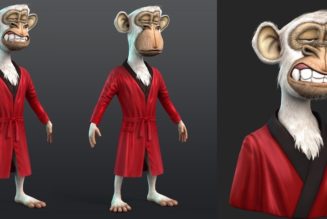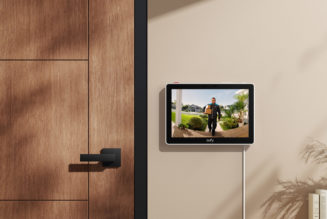You’re walking through the woods when a cat approaches you. “It’s not safe out here” they say, asking you to accompany them back to their home. Upon arrival at a delightfully kitsch cabin you’re presented with a bowl of warm stew, a thick coat, and a sword to protect you from outside dangers. You pay the cat four “dabloons” and venture back outside to continue your journey.
No, this isn’t a new Elder Scrolls game — it’s the latest viral trend sweeping TikTok, which saw a niche in-joke rapidly expand into an immersive roleplaying experience within a matter of days.
:format(webp)/cdn.vox-cdn.com/uploads/chorus_asset/file/24225511/dabloon_cat.jpg)
According to KnowYourMeme’s timestamp, a picture of a cat with an outstretched paw was posted to the catz.jpeg page on Instagram in April 2021, alongside the misspelled caption “4 dabloons.” Given the nature of “cats + the internet” this image inevitably made its way onto TikTok, where it had evolved into a four-panel meme by October this year. The meme, which follows the format of a user pretending to be said cat offering goods in exchange for said dabloons, then went viral on November 19th following TikTok user @eblxxdyblxxd posting their own variant of the gag.
While it riffed on common video game tropes, this meme clearly wasn’t intended as a roleplay opportunity at the time. But then some users flipped the joke to instead gift the user four dabloons. And then, people started to keep track of their cash as though it were a real game.
:format(webp)/cdn.vox-cdn.com/uploads/chorus_asset/file/24225533/ceb.jpg)
Cats became merchants, aiding weary travelers (that’s you) on a perilous journey. Users were robbed of their fictional currency by rogue thieves. Wares like weapons and guard dogs soon became available to buy in order for users to protect their wealth and Dabloonionaire’s rewarded you handsomely for completing their quests. There are even dabloon lotteries and a dabloon IRS. The four-panel meme format has since expanded to include elaborately-edited videos, and entire accounts have been created pretending to be shops, mafia headquarters, and government watchdogs.
The trend was created entirely by TikTok’s userbase rather than the app itself, though it relies on its algorithm to deliver the seemingly randomized events to potential participants. These videos and image slideshows have dominated the feeds of anyone caught within the DabloonTok algorithm and are roleplayed out within each video’s comment section, as users graciously pay a fictitious currency to eat fictitious food, stay in a fictitious bed, and admit defeat when fictitiously attacked by fictitious bandits.
Still with us? Good. Regardless of its origins, no account or group can be credited as a singular driving force behind what this cat meme has since become (and continues to evolve into).
A completely organic, semi-functional virtual economy was created when people started keeping track of their purchases and available finances through spreadsheets and notebooks. Two nights ago I saw numerous “breaking news” bulletins featuring feline correspondents reporting on the crashing value of dabloons, naming and shaming the accounts of users “giving away” irresponsible sums of the fictitious currency. Councils were formed to regulate the market, and now there are secret anti-dabloon capitalist rebellions forming to overthrow the system. And all of this happened in the span of just three days.
The evolution of TikTok’s current viral gimmick has vaguely started to mirror real-world events outside of the platform — namely the ongoing financial crisis and crashing cryptocurrency market. This is likely unintentional, stemming from financially literate users building on posts that give away unreasonable quantities of dabloons, but it’s amusingly managed to simulate a real financial disaster without any of its discourse. Users simply play along with whatever eventuality appears on their TikTok feed, making the trend unusually innocent compared to the vitriol publicly spewed on either side of a real economic fallout.
And that’s the point right? Roleplaying on social media is far from new. Sites like Facebook, Myspace, and Livejournal could be adapted to roleplay just about anything, creating collaborative “tell your own adventure” stories around a centralized theme that allowed users to play a part in a fictional, semi-functional society without any of the real repercussions. Drama, but without the drama. All a platform really needed to facilitate this niche flavor of escapism was two features: the ability to publicly interact with posts and other users, and a means to isolate activity within groups, pages, or subsections.
Given TikTok lacks the latter quality in addition to being a video-first platform, it should have been incredibly difficult for this kind of activity to take off. And yet, TikTok’s algorithm has uniquely allowed for a crowdsourced game — one where the platform itself controls how often you play. User-generated content controls what happens to you, and you control to what extent you want to play along. This is a cultural phenomenon that couldn’t really happen on other social media platforms. It’s just pure, senseless fun.
:format(webp)/cdn.vox-cdn.com/uploads/chorus_asset/file/24225538/Dabloon_roleplay.jpg)
At least for now anyway. TikTok trends tend to die as quickly as they appear due to how rapidly content spreads across the platform, but I’m enjoying this resurgence of social media roleplay while it lasts.
Outside of my fantasy dabloon fiefdom, I feel fatigued by current social media platforms: I’ve grown weary of Twitter’s cliquey atmosphere and antagonizing personalities. Tumblr has a much smaller active community than in its heyday, and let’s be honest, nobody is really using Facebook to socialize anymore. Watching how eager TikTok users were to immediately play into this gag may be indicative of a resurgence in social media roleplay, aided in no certain terms by the rising mainstream popularity of established roleplaying systems like Dungeons & Dragons. Perhaps the “gamification” of social media is what’s needed to preserve it.









